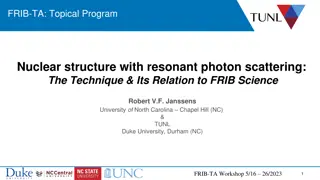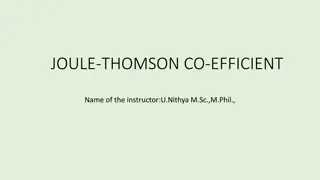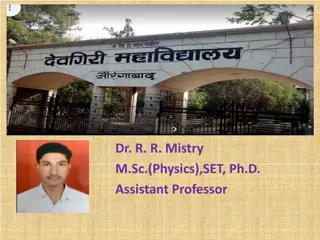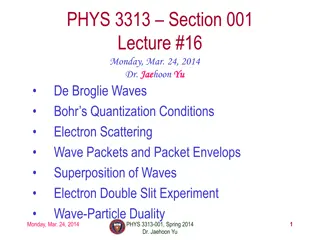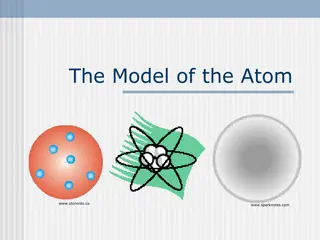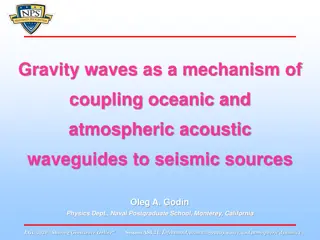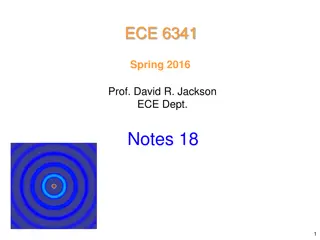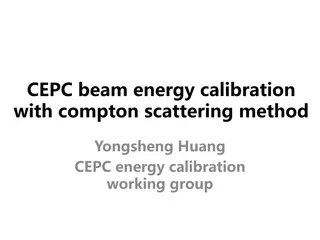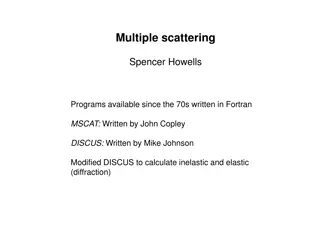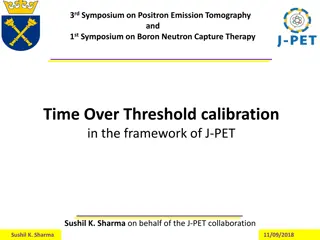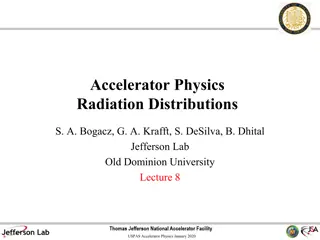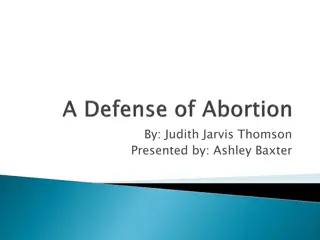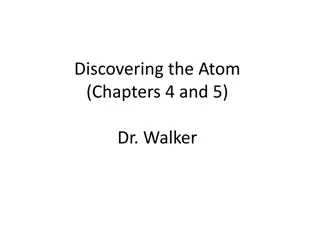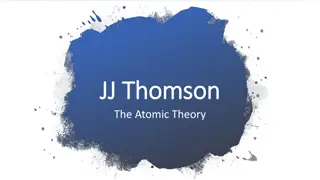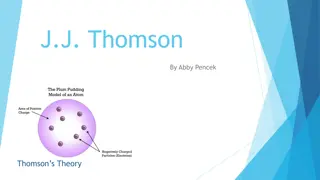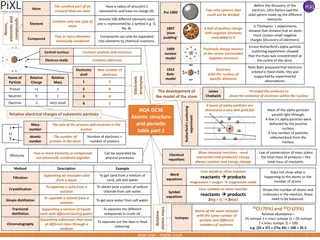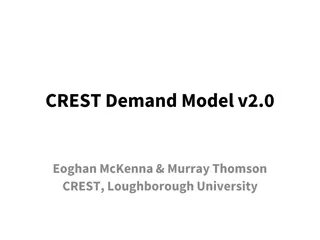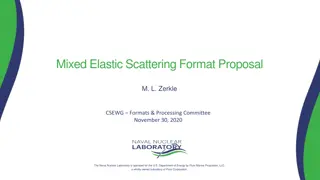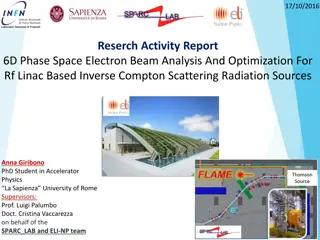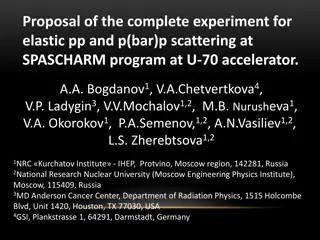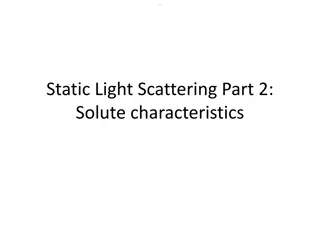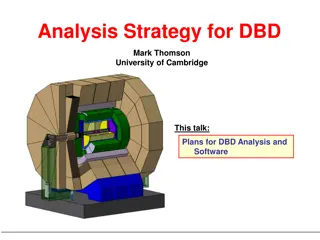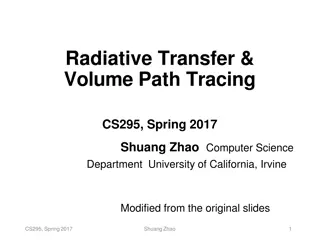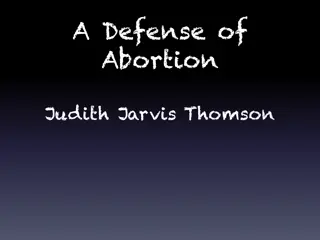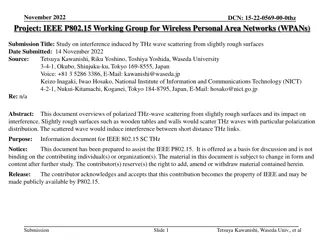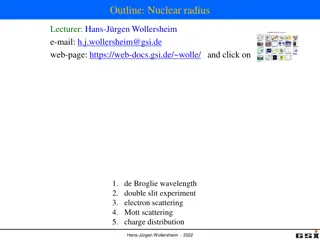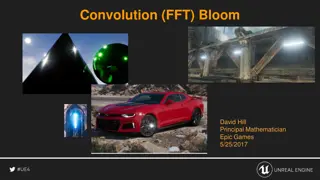Advanced Techniques in Materials Science: Transmission Electron Microscopy
Explore the advanced techniques used in materials science, focusing on Transmission Electron Microscopy (TEM). Learn about the challenges with optical microscopes, the principles of TEM imaging, and the application of scattering theory in electron microscopy. Discover how TEM offers higher resolutio
3 views • 19 slides
Understanding Atomic Structure: The Evolution of Atomic Theories
Explore the journey of atomic theory from Democritus to Dalton and Thomson, uncovering the discoveries and concepts that shaped our understanding of the building blocks of matter. From the indivisible atoms proposed by Democritus to Dalton's theory of elements and compounds, and Thomson's experiment
6 views • 36 slides
Nuclear Structure Investigations with Resonant Photon Scattering at FRIB-TA Workshop
Explore nuclear structure using resonant photon scattering at the FRIB-TA Workshop. The High Intensity Gamma-ray Source facility enables research on photonuclear reactions, spin and parity determinations, and selective investigation of nuclear states. Learn about the technique's potential impact on
2 views • 33 slides
Understanding Joule-Thomson Coefficient in Thermodynamics
The Joule-Thomson coefficient describes the relationship between temperature and pressure changes in a substance. This coefficient impacts the direction of temperature change when pressure is altered. With equations and explanations provided by U. Nithya, M.Sc., M.Phil., this summary covers the defi
2 views • 11 slides
G.P. Thomson's Experiment: Confirmation of Matter Wave Nature of Electrons
The experiment conducted by G.P. Thomson in 1928 confirmed the matter wave nature of electrons through diffraction patterns obtained when high-speed electrons were diffracted from a thin metallic film. The setup involved accelerating electrons through a high potential, incident on a gold foil, and t
0 views • 6 slides
Building a Business Empire: Insights from Dr. Thomson Frank Mpinganjira, CEO of FDH Financial Holdings Limited
Dr. Thomson Frank Mpinganjira, the Group Chief Executive Officer of FDH Financial Holdings Limited, shares his journey in building a successful business empire, including overcoming hurdles, setting up financial institutions, and principles of business growth. His experiences aim to inspire entrepre
0 views • 56 slides
Understanding WRDS 13F Holdings Data and Recent Thomson Data Issues
Delve into the realm of 13F holdings data on WRDS, covering historical stock holdings, factset ownership, and SEC requirements. Explore examples, linking to other data, and recent issues with Thomson 13F data. Stay informed about the evolving landscape of institutional investment data.
2 views • 8 slides
Advanced Neutron Scattering Research Project at ORNL
This project proposal outlines a research opportunity at Oak Ridge National Laboratory (ORNL) focusing on forefront scientific problems and the strategic value of neutron scattering techniques. Graduate students will benefit from valuable experience and collaboration opportunities during their time
0 views • 5 slides
Exploring De Broglie Waves, Bohr's Quantization, and Electron Scattering in Physics
Discover the fascinating concepts of De Broglie waves, Bohr's quantization conditions, and electron scattering in physics. Delve into the wave-particle duality, electron double-slit experiments, and the groundbreaking observations by Davisson and Germer. Uncover the implications of mass particles ha
0 views • 23 slides
Introduction to Dynamic Light Scattering - Day 1 Recap
Introduction to Dynamic Light Scattering covered concepts, lab measurements, and analysis of diffusive time scales. Topics included measuring DI water, PS latex spheres, and a mystery sample. Results showed highly mono-dispersed PS latex standards and discussed challenges in analyzing mixtures of di
0 views • 4 slides
Evolution of Atomic Models: From Thomson to Bohr
Scientists from J.J. Thomson to Niels Bohr made groundbreaking discoveries in understanding the structure of the atom. Thomson's plum-pudding model was followed by Rutherford's nuclear model, revealing the nucleus. Bohr introduced the concept of discrete energy levels and orbits for electrons. These
4 views • 22 slides
Gravity Waves as a Mechanism of Coupling Oceanic and Atmospheric Acoustic Waveguides to Seismic Sources
Direct excitation of acoustic normal modes in horizontally stratified oceanic waveguides is negligible for shallow earthquakes due to velocity disparities. This study evaluates the contribution of scattering by hydrodynamic waves in generating abyssal T-waves. The research explores the role of scatt
1 views • 6 slides
Electromagnetic Scattering by Wedge and Line Source Notes
In these notes from ECE 6341, Spring 2016, Prof. David R. Jackson covers the topic of scattering by a wedge and line source. The discussion includes boundary conditions, Bessel functions, integration techniques, and more, providing a thorough exploration of the electromagnetic phenomena involved.
0 views • 27 slides
Beam Energy Calibration with Compton Scattering Method
The CEPC beam energy calibration with Compton scattering method led by Yongsheng Huang and the CEPC energy calibration working group involves collaborations with various institutions and organizations. The project includes detailed physics requirements, system designs, and implementation plans for b
0 views • 14 slides
Understanding PN Junction in Semiconductors
Mobility in semiconductors is affected by scattering events as temperature increases, with impurity scattering dominating at low temperatures and lattice scattering at high temperatures. A p-n junction is the interface between p-type and n-type semiconductor materials, with excess holes on the p-sid
0 views • 15 slides
Journey Through Atomic Models: From Thomson's Plum Pudding to Rutherford's Gold Foil Experiment
Explore the evolution of atomic models starting with J.J. Thomson's Plum Pudding Model in 1897, where the discovery of electrons led to the belief of a positive "glue." Follow the progression to Ernest Rutherford's Gold Foil Experiment in 1910, challenging the Plum Pudding Model and unveiling the nu
0 views • 27 slides
Understanding Multiple Scattering Programs in Fortran for Neutron Diffraction and Inelastic Analysis
Multiple scattering programs like MSCAT and DISCUS, written in Fortran since the 70s, are essential tools for neutron diffraction and inelastic analysis. These programs allow for the calculation of neutron cross-sections, scattering angles, and sample geometries. The results obtained include elastic
0 views • 8 slides
Understanding Semiconductor Conductivity and Scattering Mechanisms
In the study of semiconductor conductivity, the concept of degenerate and non-degenerate semiconductors is discussed, showcasing the impact of doping levels. The conductivity equation is explored in terms of electron and hole mobilities and densities. The role of scattering mechanisms, such as latti
0 views • 18 slides
Symposium on Positron Emission Tomography and Boron Neutron Capture Therapy Time-Over-Threshold Calibration in J-PET
The 3rd Symposium on Positron Emission Tomography and 1st Symposium on Boron Neutron Capture Therapy focused on Time-Over-Threshold calibration within the framework of J-PET. The event outlined experimental details, event selection, results, and key features of the Jagiellonian Positron Emission Tom
0 views • 35 slides
Comprehensive Overview of Radiation Distributions in Accelerator Physics
Explore the intricate calculations and theoretical frameworks of radiation distributions in the context of pulsed high-field strength lasers interacting with electrons, covering topics such as Thomson scattering, undulators, and historical developments in the field. The discussion delves into the nu
0 views • 57 slides
The Ethics of Abortion: Perspectives and Arguments
The discussion revolves around Judith Jarvis Thomson's views on abortion, challenging the notion that a fetus is a person from conception. Various arguments are presented, such as the violinist analogy and the right to life vs. bodily autonomy debate. Thomson's analysis refutes extreme views on abor
0 views • 11 slides
Evolution of Atomic Theory: From Democritus to Thomson
Examine the evolution of atomic theory through the contributions of key scientists such as Democritus, Dalton, and Thomson. Explore the concept of subatomic particles, different models of the atom, and the impact of experiments on our understanding of the atom over time. From the solid sphere model
0 views • 33 slides
JJ Thomson: Discoverer of the Electron and Pioneer in Atomic Theory
JJ Thomson, Nobel Prize-winning physicist, discovered the electron in 1897 through his study of cathode rays. He proposed the Plum Pudding Model of the atom, revolutionizing the understanding of atomic structure. His work on electrons, isotopes, and mass spectrography solidified his legacy as a lead
0 views • 7 slides
The Impact of J.J. Thomson's Discovery of the Electron on Atomic Theory
J.J. Thomson's groundbreaking discovery of the electron in 1897 revolutionized the understanding of atoms. His Plum Pudding Model proposed in 1904 depicted electrons embedded in a positively charged matter, challenging the previous Dalton's Billiard Ball Model. This discovery transformed the atomic
0 views • 7 slides
Evolution of Atomic Theory Through the Ages
Explore the fascinating journey of the atomic theory from the ancient ideas of Democritus in 450 BC to the groundbreaking discoveries by scientists like Benjamin Franklin, John Dalton, Sir William Crookes, J.J. Thomson, and more. Witness the evolution of our understanding of atoms and their structur
0 views • 21 slides
Development of the Atomic Model: From Dalton to Rutherford
Before the discovery of the electron, John Dalton proposed the solid sphere model for elements, while JJ Thomson's experiments led to the discovery of electrons. Ernest Rutherford's alpha particle scattering experiment revealed the concentrated mass at the nucleus, which formed the basis of the nucl
0 views • 4 slides
Evolution of Atomic Theory: From Democritus to JJ Thomson
Foundations of atomic theory trace back to Democritus and Aristotle, evolving through the discovery of laws in the 18th century by Dalton's Atomic Theory. Modern advancements and JJ Thomson's discoveries led to a deeper understanding of the structure of atoms.
0 views • 40 slides
CREST Demand Model v2.0 Eoghan McKenna & Murray Thomson
The CREST Demand Model v2.0, developed by Eoghan McKenna & Murray Thomson at Loughborough University, is a comprehensive simulation tool that analyzes the energy demand of dwellings. It considers factors such as solar thermal collectors, climate data, irradiance, electrical demand, temperature, gas
0 views • 4 slides
Mixed Elastic Scattering Format Proposal
This proposal focuses on introducing a Mixed Elastic Scattering format to address the need for a more rigorous treatment of thermal elastic scattering effects in selected nuclides. The format extension, compatible with ENDF-6, supports advanced moderator development without impacting existing TSL ev
0 views • 6 slides
Electron Beam Analysis and Optimization for RF Linac in Inverse Compton Scattering
This research activity report discusses the analysis and optimization of a 6D phase space electron beam for RF Linac-based Inverse Compton Scattering radiation sources. It covers the SPARC_LAB Thomson Source and ELI-NP GBS, including experiments, simulations, and studies on beam parameters and struc
0 views • 26 slides
Investigation of Spin Observables in Elastic pp and p(bar)p Scattering at SPASCHARM Program
Measurements of spin observables in elastic pp and p(bar)p scattering at 16 GeV will be conducted at the SPASCHARM program using a unique setup with polarized proton and antiproton beams. The experiment aims to extend the energy range for spin studies and compare elastic scattering in pp and p(bar)p
0 views • 24 slides
Understanding Light Scattering Part 2: Solute Characteristics and Applications
Light scattering can provide valuable insights into solute characteristics such as molecular weight, radius of gyration, and second virial coefficient. By analyzing scattering data, information about individual particles and their arrangement in solution can be obtained. Techniques like Zimm or Guin
0 views • 20 slides
Analysis Strategy for DBD by Mark Thomson - University of Cambridge
Mark Thomson from the University of Cambridge presented the analysis strategy for the Dual-Beta Detector (DBD) at the ILD Analysis Meeting in Paris, focusing on software models, reconstruction, and validation plans. The strategy includes goals to ensure required physics analyses, develop software mo
0 views • 11 slides
Understanding Radiative Transfer and Volume Path Tracing
Explore the mathematical model of radiative transfer for simulating light scattering in participating media and translucent materials through volume path tracing. Learn about subsurface scattering and how radiance changes along ray segments in participating media. Delve into the origins and applicat
0 views • 44 slides
Understanding Scattering Phenomenon: Key Concepts and Applications
Scattering is a fundamental process involving the interaction of light with particles, impacting various fields such as physics and environmental science. Learn about its measurement theory, dependence on physical properties, and examples like Rayleigh theory for small particle scattering and impact
0 views • 36 slides
Insights into Intra-Beam Scattering Effects and Plasma Dynamics in Particle Colliders
Intra-Beam Scattering (IBS) effects near transition crossing in NICA collider result in energy exchange between different degrees of freedom, impacting beam size, luminosity, and lifetime. The IBS phenomenon is crucial for circular machines, with theoretical developments by Piwinski and Bjorken shap
0 views • 15 slides
A Defense of Abortion by Judith Jarvis Thomson
Judith Jarvis Thomson, an American moral philosopher, presents thought-provoking ideas on the permissibility of abortion. She challenges the focus on whether a fetus is a person and instead explores the arguments surrounding a woman's right to her own body, especially in extreme cases where the moth
0 views • 17 slides
Study on THz Wave Scattering from Slightly Rough Surfaces: Interference and Implications
Overview of polarized THz wave scattering from slightly rough surfaces such as wooden tables and walls. The document discusses the induced interference between short-distance THz links and presents a model of electromagnetic wave scattering with examples of experimental and numerical results. Potent
0 views • 17 slides
Insights into Nuclear Radius and Electron Scattering Experiments
Delve into the realm of nuclear physics with a focus on nuclear radii and electron scattering experiments led by lecturer Hans-Jürgen Wollersheim. Explore topics such as de Broglie wavelength, double-slit experiment, Mott scattering, charge distribution, and the use of electrons as probes to measur
0 views • 9 slides
Understanding Bloom Effects in Game Design
Bloom effects, such as weak scattering and convolution, enhance the visual appeal of games by simulating light scattering. They add realism and customization options to game graphics, improving the overall visual experience. Weak scattering causes subtle yet impactful effects like glare and diffract
1 views • 14 slides


